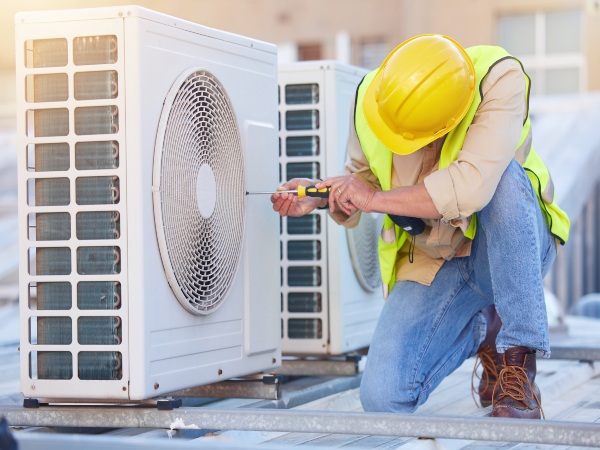Some Ideas on Ac Fixing You Need To Know
Some Ideas on Ac Fixing You Need To Know
Blog Article
Air Conditioning A/c Repair: Expert Cooling System Repair Ensures Your Home Remains Comfortable Throughout The Most Popular Days

Common A/c Problems
Have you ever felt that unexpected rush of warm air simply when you anticipated a cool breeze? It's aggravating, isn't it? Lots of house owners face this problem, typically uninformed of what prowls below the surface of their a/c system. Let's decipher the secret behind a few of the most regular problems that demand prompt a/c repair work.
Why Won't My A/c Cool Correctly?
When your a/c unit blows lukewarm air rather of a refreshing chill, it's a clear sign something's off. A clogged up filter or low refrigerant levels frequently play the bad guy here. Imagine trying to breathe through a headscarf on a hot day-- that's what a dirty filter does to your system. Ever questioned why your energy expenses spike when the cooling drops? That's your air conditioning having a hard time more difficult to make up for inefficiencies.
Weird Noises and What They Mean
Clicking, buzzing, or rattling sounds aren't simply sounds-- they're cries for assistance. A loose belt or a failing motor may be the perpetrators. One house owner stated how a persistent grinding sound ended up being a worn-out compressor, conserving them from a total breakdown by acting rapidly.
Common Problems at a Glance
| Symptom | Likely Cause | Quick Fix |
|---|---|---|
| Warm Air | Low refrigerant or unclean filter | Replace filter, check refrigerant levels |
| Water Leaks | Blocked drain line or frozen coils | Clear drain line, thaw coils |
| Unusual Sounds | Loose parts or motor problems | Tighten up parts, inspect motor |
Is Your air conditioner Biking On and Off?
Short cycling is more than an annoyance; it can drastically minimize your system's lifespan. This might signal a large unit or a thermostat glitch. Have you seen your system switching on and off like a flickering light? Do not disregard it. It's a subtle tip advising you to contact the specialists before it turns into a pricey disaster.
- Dirty filters and coils trigger air flow problems.
- Thermostat breakdowns result in irregular temperatures.
- Electrical concerns can stop your air conditioning from starting.
Important Tools for Cooling Repair
Ever stood in front of a vast air conditioning unit wondering which tool will open the secret? The right instruments can make all the difference between a fast repair and an endless afternoon of aggravation. For example, a digital manifold gauge set isn't just a fancy gadget; it's the investigator's magnifying glass worldwide of refrigerant pressure. Its accuracy helps identify leaks or imbalances that a casual look might miss out on.
When handling stubborn or rusted components, a quality tubing cutter is worth its weight in gold. It slices through copper pipes easily, avoiding damage that could cause expensive leakages. Have you ever attempted to bend copper tubing by hand only to end up with kinks? Avoiding this requires specialized bending tools created to preserve the pipe's integrity.
Tools That Professionals Swear By
- Air pump: Vital for removing wetness and air from the system before charging refrigerant, making sure ideal efficiency.
- Drip detector: An essential for capturing undetectable refrigerant leaks that can trigger system inadequacy.
- Multimeter: Beyond determining voltage, it's important for diagnosing electrical faults within the air conditioner's control system.
- Fin comb: A little yet magnificent tool that corrects the alignment of bent condenser fins, enhancing air flow and performance.
Pro Tips for Using A/c Repair Work Tools
- Constantly verify your gauge readings against manufacturer specs; even seasoned techs confirm to avoid expensive misdiagnoses.
- When utilizing a vacuum pump, make sure all valves and hose pipes are airtight; a minor leak can ruin the evacuation process.
- Clean your fin comb frequently. Dust and gunk can cause it to snag, damaging delicate fins further.
In the heat of summertime, a malfunctioning compressor or blocked filter can seem like a ticking time bomb. However equipped with the right tools and knowledge, the repair becomes less of an ordeal and more of a satisfying puzzle solved. Isn't it curious how a well-calibrated gauge or an easy leak detector can transform the whole outcome?
Step-by-Step Repair Work Process
Ever noticed how your air conditioning unit starts to sputter, hardly whispering the cool breeze it once provided? The very first move is a thorough diagnosis-- due to the fact that thinking just wastes time and resources. You may start by inspecting the thermostat settings, but sometimes the real culprit prowls deeper.
1. Preliminary Evaluation and Diagnostic
Begin by powering off the system to prevent shocks. Open the gain access to panels and aesthetically inspect for scorched wires, clogged filters, or ice buildup. A common oversight is overlooking the condenser coils; dust and dirt here can choke performance. Use a multimeter to test electrical elements and validate if the compressor is getting power.
2. Identifying Refrigerant Issues
Does the unit blow warm air? That's frequently an indication of low refrigerant levels or leaks. Professionals use a manifold gauge set to determine pressure properly. Remember, overcharging or undercharging the system can trigger permanent damage-- precise measurement is essential.
3. Cleaning and Element Replacement
Sometimes, an easy coil cleaning revives the system. Other times, it requires swapping out capacitors, contactors, or fan motors. Replacing these parts involves mindful disassembly and reassembly; skipping actions can lead to further breakdowns.
4. System Screening and Calibration
Once repairs are made, change the system back on and observe its behavior. Step the temperature drop throughout the evaporator coil-- it must be roughly 15-20 ° F. If not, recalibrate the thermostat or look for airflow obstructions.
Specialist Tips
- Avoid running the compressor without refrigerant-- this burns out the motor quickly.
- Use a UV color to track down elusive leaks; they're frequently hidden in hard-to-reach areas.
- Never ever neglect the drain line-- clogs here can cause water damage and system failure.
- Wear insulated gloves when handling capacitors; they retain charge and can deliver a nasty shock.
Defending Against Abrupt Breakdowns
Have you ever wondered why your a/c unit sputters to a stop right at the peak of summertime? The truth is, ignoring regular maintenance often welcomes unforeseen failures. Dust, particles, and worn-out elements wage a quiet war inside your system. Preventive maintenance is the ace in the hole-- catching minor problems before they spiral out of control.
Specialist Tips for Keeping Your Air Conditioner in Top Shape
Air Conditioning Jacksonville FLAir Conditioning Repair Jacksonville FL
Air Conditioning Repair In Jacksonville FL
Air Conditioning Installer Jacksonville FL
Best Air Conditioning Services Jacksonville FL
- Clean or change filters month-to-month: A stopped up filter chokes air flow, forcing the system to work overtime and speeding up wear.
- Examine coil fins: Bent fins restrict air passage, just like a traffic congestion in your cooling system. Use a fin comb to correct them carefully.
- Inspect refrigerant levels: Low refrigerant can cause the compressor to get too hot, a precursor to pricey repairs.
- Clear the condensate drain: Blockages here can lead to water damage and mold development, a concealed culprit behind sticking around odors.
- Examine electrical connections: Loose electrical wiring or corroded terminals often spark periodic failures, a subtle indication.

When Was the Last Time You Listened to Your a/c?
That faint rattling or uncommon hum might appear minor, but it's a precursor to bigger mechanical problems. One summer, a client discussed a soft buzzing noise. A quick inspection exposed a check here loose fan blade-- easy to repair, yet left unattended, it could have shattered the motor. Minutes like these underscore the value of regular checks.
Quick List for Seasonal Prep
| Action | Frequency | Why It Matters |
|---|---|---|
| Filter cleaning/replacement | Every one month | Maintains airflow and performance |
| Coil and fin inspection | Twice a year | Avoids airflow limitations |
| Refrigerant level check | Yearly | Guarantees correct cooling capacity |
| Drain pipes line clearing | Every 6 months | Avoids water damage and mold |
| Electrical system assessment | Annually | Avoids unexpected shutdowns |
Pro Idea: Beyond the Basics
Did you understand that lightly oiling the fan motor bearings every year can extend their life expectancy? It's an information typically ignored however vital. Shading your outdoor unit from direct sunshine can lower the compressor's work, subtly boosting longevity. Remember, the health of your air conditioner is a reflection of the attention you provide it before it shouts for aid.
Report this page